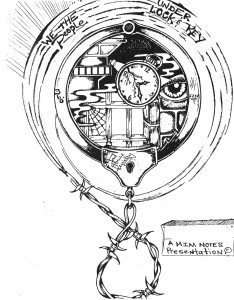Exploitation = Paying Prisoners 15 Cents an Hour for their Labor & Charging $150 for a Black & White TV…
 Last week, I featured the story of Paul that was documented in the Tri-County Times. The story provided a detailed account of a prisoner’s life on the inside. Part 2 of that story was published on Friday while I was on hiatus.
Last week, I featured the story of Paul that was documented in the Tri-County Times. The story provided a detailed account of a prisoner’s life on the inside. Part 2 of that story was published on Friday while I was on hiatus.
Below I highlight the part of the article that speaks to the prison economy:
Prisoners with jobs work during yard time. Paul was a “porter,” doing janitorial work.
Taxpayers provide the buildings, the staff, and basic room and board. Deodorant, razors, shampoo, chips, ramen noodles, a personal TV or radio has to be purchased from a prison store. That money comes from prison jobs like Paul’s, who made approximately 15 cents an hour, working 40 hours per week [emphasis mine]. Money from families also paid for extra items.
Essentially, said Paul, families give inmates the small daily pleasures the prison does not. A small, black-and-white TV, with a clear case to prevent inmates from hiding contraband inside, can be purchased for $150. “You sit that (TV) on the shelf of the bunk bed, and you use your toe for the remote control,” said Paul.
Inmates, who don’t have family support or a prison job, can’t buy deodorant or razors for shaving. They can “hustle,” by rolling cigarettes or doing other odd jobs for inmates.
What jumps out of course is the $0.15 cents an hour that Paul was paid to work as a janitor and the fact that prisoners rely so heavily on their families to help provide them with financial support while they are on the inside. Since we know that most prisoners are poor people, one can only imagine the financial strain that this places on family members who are likely to be just scrapping by themselves.
The second key part of the passage above is the fact that the prison store is marking up the cost of a small black and white TV to $150 which is obscene.
Finally, the prisoners who do not have jobs nor families to help provide them with financial support have to “hustle” to get money for basic hygiene products. This is wrong. While we are pushing for decarceration, basic hygiene products should be provided to all prisoners as a human right.
The rest of the article highlights the role that religion played in getting Paul through his incarceration, the relationships that he built with other prisoners and his life since he was paroled. It is well worth reading the entire story.
